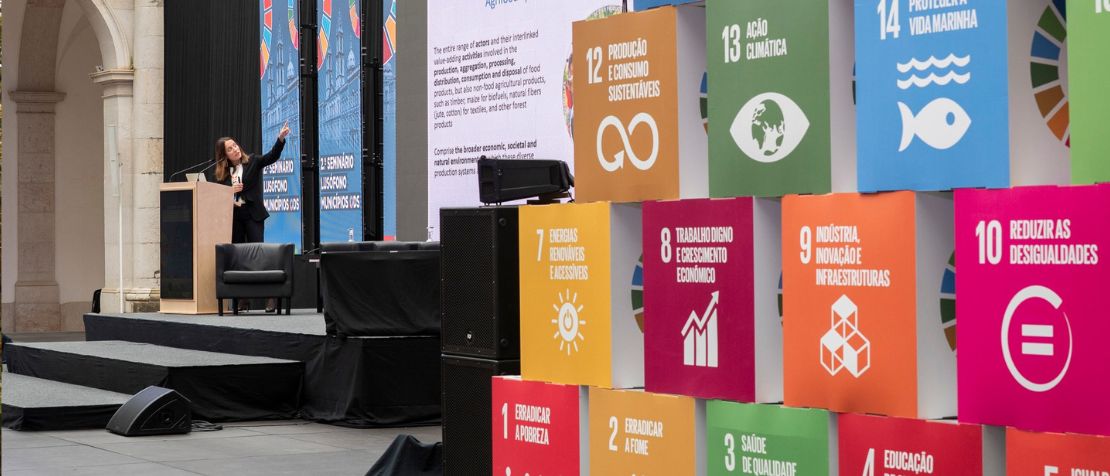Peer-to-peer learning helps municipalities to localize the Sustainable Development Goals

©Municipality of Mafra
A group of municipality representatives from Bosnia and Herzegovina and Georgia visited Mafra, a Portuguese municipality, last week to learn more from its example on localizing the Sustainable Development Goals (SDGs).
Mafra has shown a strong commitment in overall SDG implementation at the municipal level and in the development of a Voluntary Local Review (VLR), the internationally accepted process to review the implementation of SDGs at sub-national level. Municipalities from Bosnia and Herzegovina and Georgia are currently developing their action-oriented VLRs and are interested to benefit from Mafra’s experience. The participating municipalities of Bijeljina, Kakanj, Maglaj, and Trebinje from Bosnia and Herzegovina and Khashuri and Poti from Georgia, are joining a growing number of local and regional governments across the globe who are using the Voluntary Local Reviews to accelerate SDG localization. By getting hands-on experience from the Municipality of Mafra, and having a targeted knowledge exchange, these local governments are better equipped to complete their VLRs and enhance their food systems-related initiatives.
The study tour was organized by the Food and Agriculture Organization of the United Nations (FAO), in close cooperation with United Nations Human Settlements Programme (UN-Habitat) and the United Nations Development Programme (UNDP).
The delegation also participated in the second Lusophone SDG Seminar, hosted by the Municipality of Mafra. It was an invaluable opportunity to learn from a diverse network of Lusophone municipalities and relevant actors on advancing the Sustainable Development Goals at the local level. The Mayor of Mafra, Hugo Manuel Moreira Luís, opened the seminar together with Paulo Lopes Marcelo, Secretary of State for the Presidency of the Council of Ministers of Portugal, highlighting the role of SDGs in creating a common language for co-creation of more integrated policies.
During the study tour, Valeria Rocca, FAO Senior Regional SDG Advisor, emphasized the unique opportunity of having representatives from three United Nations agencies present together in Mafra. "This is taking place within the context of developing Voluntary Local Reviews, and it is important to recognize how they can serve as a vehicle for greater integration—both within the UN system and in the formulation of local policies."
She also underscored the importance of incorporating agrifood systems into VLRs, noting that agrifood systems transformation is globally recognized as a key accelerator for achieving the SDGs.
Additionally, local governments from Bosnia and Herzegovina and Georgia had the chance to see working solutions to circular economy, biodiversity integration into urban and spatial planning, waste management, wastewater reuse, and promotion of sustainable food systems at local level through an established network of local authorities and actors. Further aspects of the exchange – and the successful realization of the global goals – included innovative financing and strategic partnerships.
In a preceding virtual technical exchange on action-oriented Voluntary Local Reviews organized by FAO and UN-Habitat in April, 50 participants came together from municipalities from Bosnia and Herzegovina and Georgia developing VLRs, but also Nis (Serbia), Mafra (Portugal) and representatives from the national government from Tajikistan.
“Agrifood systems are often underrepresented in local development strategies,” Raimund Jehle, FAO Regional Programme Leader pointed out an important aspect at the virtual workshop, adding that integrating them can “uncover new opportunities for advancing SDG 2 on Zero hunger and other goals” related to healthy diets, food safety, food loss and waste, and sustainable value chains.
The virtual workshop and the study tour came at a critical moment, as Rafael Tuts, Director of UN-Habitat’s Global Solutions Division, emphasized the need for more knowledge sharing and capacity building to help progress SDG implementation through the voluntary local reviews. According to him, the VLRs are not only monitoring instruments, but also “catalysts” for sustainable development.
When adopting the 2030 Agenda in 2015, countries committed to work closely with local and regional governments on the implementation of the SDGs, bringing the global goals closer to the people they serve and using the framework as a tool for planning and implementation.
With only five years left to realize the Sustainable Development Goals that provide a global pathway for an equitable, prosperous, and environmentally friendly future, actors at all levels should step up and take actions to turn this vision into reality.
The municipalities who have joined this initiative supported by FAO, UN-Habitat, and UNDP are capitalizing on multistakeholder partnerships, peer-to-peer learning while raising awareness of their local priorities and advocating for change and transformation.
